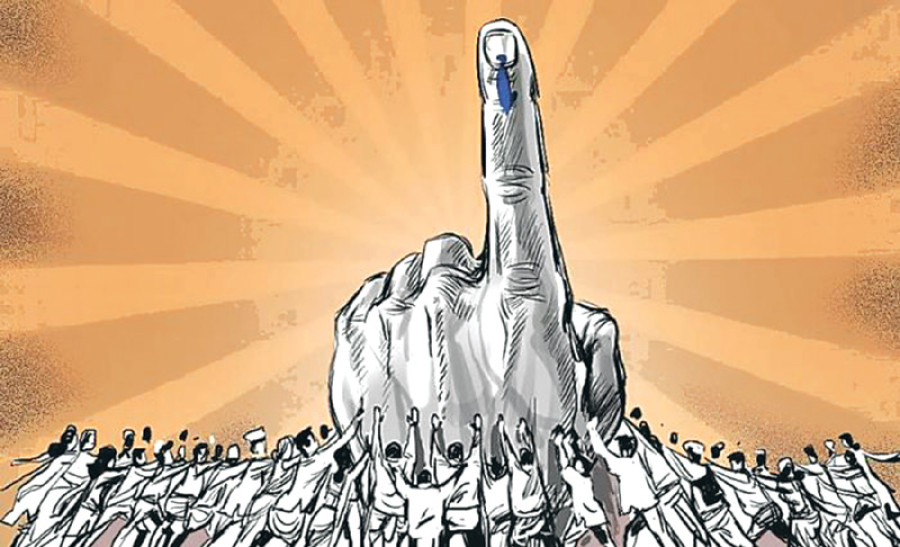Opinion
A critical moment
As Nepal’s economic prospects expand, who benefits and how will depend on the success of its democratic system
As the window for elections in May or June is closing, the government is under increasing pressure. The current ruling coalition was formed on the premise that elections would not be possible without appeasing the Madhesi Morcha, and that the only way to appease them is through an amendment of the constitution. So the legitimacy of the government would be in question if it fails to hold the elections on time or to bring in the Madhesi Morcha into the political process.
The question of election announcement first or constitutional amendment first has become significant because of the time pressure. Only two windows are open for the next round of elections—May or November—before Parliament dissolves in January next year.
Troubled waters
The Madhesi Morcha want to ensure that constitution amendment happens before the election is announced. However, since the Election Commission needs an advance notice of about four months, the time to announce the local elections for the May-June window is about to pass.
The government, which is under intense pressure, is receiving sympathy from neither the Madhesi Morcha nor the CPN-UML. The UML, which has fundamental differences with the rationale of the current government, is intent on undermining its legitimacy and pushing for elections without constitution amendment.
If the current ruling alliance is able to muster a two-thirds majority for constitution amendment, then the Madhesi Morcha will have to allow local elections, although some of their demands will remain unfulfilled. The UML will remain dissatisfied and will continue to focus all its energy on the upcoming round of elections.
If the amendment does not pass, then the situation in the Madhes may worsen, given the role of the Madhesi Morcha, CK Raut and the increase in activities of certain armed groups. The question, in such a scenario, will be whether elections would be possible in the Madhes or not. At the same time, the UML will intensify its efforts to delegitimise the government and push for a new regime.
More is at stake than the legitimacy of the government. A continued political stalemate will affect Nepal’s peace, stability, democracy, economic development and quality of life.
If Nepal is unable to quickly resolve differences around federalism, demarcation of constituencies, and political demands of the Madhesis, it would face a challenge maintaining justice and peace. In the absence of peaceful relations between groups, the government will need to either generate a political solution through dialogue, or be able to move ahead with due political process. The role of insurgents and external powers is complicated and motivated by a desire to weaken the ability of parties like the UML to maintain their ‘nationalist’ position.
Peace and stability, one of the most valuable public goods, is becoming a rarity. According to the World Economic Forum, growing inequality and the polarisation between different groups in society are two of the most important underlying trends that will determine the future course of our societies.
Possible consequences
Nepal, already ravaged by a decade-long armed insurgency and political instability, needs political stability, justice and peace in order to embark on a path of economic prosperity. However, given the continued prevalence of social polarisation and differences on the federal system, Nepal can achieve political stability and peace only through sustained dialogue and informed politics.
Nepal’s chances of achieving peace and justice are undermined by the fact that the country is yet to institutionalise democracy. Although Nepal has established democracy on paper, it is yet to be institutionalised or reflected in practice. Political parties and their leaders are openly flouting the fundamental principles of democracy, including the system of decision-making, transparency, accountability and rule of law.
Political negotiations are led by a handful of political leaders. They are neither transparent nor democratic, in the sense that they avoid public scrutiny, democratic decision-making institutions, and defined procedures.
If the government is unable to hold three rounds of elections by January next year, when Parliament will be dissolved, the constitution will no longer be able to guide political processes. In such a scenario, political solutions will have to be found from outside the parameters of the current constitution, generating questions about its legitimacy and efficacy. But most importantly, such political processes will undermine the fundamental principle of democracy—that the decision-making system and governance should be guided by rule of law and a set system and procedures.
Another implication of a continued political stalemate directly relates to the quality of life people enjoy. As Nepal’s economy and economic prospects expand, who benefits and how will depend on the success of Nepal’s democratic system to a large extent.
In the absence of fundamental democratic systems and values, the gap between the rich and the poor, the powerful and the powerless, and the educated and the uneducated will continue to widen.
The rich and the powerful will continue to maintain boundaries to opportunities and access, and strengthen the extractive system. The very premise of such a system is to extract power and resources from the majority for the benefit of a minority.
This widening gap will create a great level of disenchantment and the quality of life will suffer. Studies have shown that even the rich cannot remain happy in societies where there is inequality. Nepal may well embark on a path of development, especially when the lure of commissions is too strong to resist. However, the development process will be guided by the interests of a small group of people who will seek to benefit directly from the superficial largesse of investors. In the social sectors, policies will continue to be shaped by the rich and powerful, undermining the efforts of the state to serve the people at large.




 9.7°C Kathmandu
9.7°C Kathmandu









